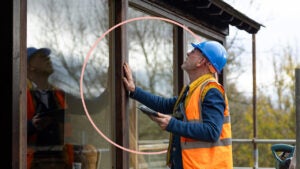Confessions of a claims adjuster: What I wish policyholders knew



“I’m the one who denies your claim.”
That’s my go-to line at cocktail parties when someone asks what I do for a living. It’s not technically accurate — but it gets a laugh. Most people don’t know what insurance adjusters do, and few want a detailed explanation. So I’ve learned to keep it short and let the conversation drift to something more relatable, like photos of my cat or dog.
But that line reveals something real. Adjusters stand between policy language and people’s expectations — and those two things rarely match. While insurance agents sell policies, adjusters assess claims to determine if the insurer should pay for damage or injuries, and if so, how much based on the policy terms.
“What, exactly, do my premiums pay for?”
This is one of the most common questions I get — usually right after explaining that something isn’t covered.
It’s often followed by a frustrated observation: “I’ve been paying premiums for 10 years. This is my first claim — my sump pump failed — and you deny it.”
It’s a common situation. The policyholder believes they have full coverage, sometimes even calling it an “all-risk” policy. Their agent may have described it that way. But every insurance policy has exclusions, and water damage is one of the most frequently misunderstood.
In this case, the loss wasn’t covered because the policy didn’t include a specific endorsement for sump pump or water backup. In states where it’s available, that coverage is optional — and it typically adds only a small cost to the premium. But even if it’s an option, many people choose lower-cost policies without realizing what they’re giving up. While you probably can’t find an endorsement for every exclusion in your policy, reviewing your options can help you bridge those coverage gaps where possible.
It’s understandable. Insurance policies are legally binding contracts written in highly technical language. Exclusions are scattered. Endorsements can remove coverage you thought you had. Sublimits cap payouts for specific losses, even if the declarations page shows a larger number. But adjusters can only pay based on the policy that was purchased.
Policyholders can avoid this surprise by asking specific questions when you purchase or renew your policy. Don’t just ask, “Is this covered?” Ask, “What’s not covered?” and “What endorsements or optional coverages are available — and which ones am I declining?” Water damage, mold, ordinance and law, and service line coverage are some of the most commonly excluded or limited areas. Knowing that up front can help you decide if the lower premium is worth the potential out-of-pocket cost later.
“My electricity is going to be turned off”
Adjusters meet people at the worst moments of their lives: a fire, a wreck, a storm. No one wants to see us coming.
I handled a claim for a woman whose semi tractor-trailer became a total loss the week before Thanksgiving. Her total claim was $60,000, but it took until February to pay her. She began calling before Christmas telling me that her children wouldn’t have gifts under the tree. Her heat was being shut off; she lived in Pennsylvania. By February, when I finally received the authorization to write the check, she was being evicted from her home.
The insured hadn’t paid the mortgage for three months. She didn’t have the money to buy a new truck so that she could earn a living.
I cried at my desk after hanging up the phone. If I could have paid her myself, I would have. But that’s not how the process works. And the longer it takes, the more frustrated the policyholder becomes.
I couldn’t tell her — and policyholders never see — that I was doing everything I could behind the scenes attempting to escalate her claim as quickly as possible.
I couldn’t say I agreed that the delay was unnecessary, or that her frustration made sense. I had to stay professional with a calm tone. I had to sing the company song.
In a first-party claim, the insured usually thinks we’re not paying enough. In a third-party claim, the insured wants us to deny the other’s claim. Then there’s pressure from inside: Managers want speed. Executives think we’re too generous.
And while it might seem like everything is digital and streamlined, the claims payment process is anything but. Large losses require multiple levels of approval. A payment request might go from the desk of the adjuster to a supervisor, then to a manager, then to a department head — each step adding time. Once approved, the release of funds moves back down the chain.
Insurance can offer valuable financial protection, but like many financial products, it can move slowly. Maintaining a robust emergency fund can help you keep your head above water if there’s a delay in your claim payout. Paying close attention to requests from the adjuster, offering detailed documentation and discussing the estimated claim timeline can help you prepare for these situations before they become dire.
Threats from angry policyholders
Most people are surprised to learn that insurance adjusters receive threats. I’ve received multiple in 25 years. My husband and father, both adjusters with more time in the field, have received more.
One man told me outright: “You better bring a gun. I’m not bringing a knife to this fight.” I was just the voice on the other end of the phone. He hadn’t even met me yet.
Some adjusters pull their ladders onto the roof during inspections — because claimants have knocked them down. Others call coworkers before site visits, just to let someone know where they are.
My husband once needed a sheriff escort to inspect storm damage. My dad was followed off a property at gunpoint. These weren’t strangers — they were policyholders who were angry, scared and looking for someone to blame.
It’s shocking, but not uncommon.
Most adjusters aren’t out to hurt anyone. We aren’t looking for reasons to deny claims. We’re doing our jobs under immense pressure — sometimes while genuinely fearing for our safety.
Most of the time, the anger isn’t really about us. These threats happen because the policy doesn’t cover the loss — and the person didn’t realize that. But I didn’t write the policy. I didn’t write the exclusions. I didn’t create the sublimits that cap payments.
This brings us back to the importance of clarifying coverage terms and limits when you buy or renew your policy. There’s no such thing as too many questions. A thorough understanding of your policy can make the claim process more efficient for you and your adjuster.
How to improve your odds of a smooth claim process
You can’t always avoid the stress of a claim, but you can take steps to make the process go more smoothly:
- Read your policy now — not later. Look at the exclusions, sublimits, and endorsements. If you’re not sure what something means, ask your agent to explain it.
- Take photos before there’s a loss. Document your home, vehicles and major belongings. You’ll be glad you did if something happens.
- Be honest and accurate. Small exaggerations or missing details can delay or complicate your claim.
- Keep receipts and records. Repairs, upgrades, temporary fixes — save it all. The more documentation you have, the easier it is to evaluate.
- Ask questions. If something doesn’t make sense, your adjuster can walk you through it. Ask the extra question today and avoid confusion tomorrow.
Adjusters are human
People don’t usually think of adjusters as emotional. But the line between professionalism and personal strain is often thinner than it looks.
It’s easy to assume that an adjuster isn’t calling you back because they’re indifferent. But maybe they’re helping a family whose children missed Christmas because a $60,000 claim took three months to approve. Maybe they just got off a call where someone threatened them. Or maybe they’re trying to hold it together after a rough morning with their teenage stepson who is going through a particularly difficult stage.
Adjusters are expected to be neutral, professional and efficient. But we’re also human. We carry other people’s losses all day, then go home and carry our own.
So no — we can’t agree with you when you say it’s unfair. We can’t say, “You’re right, this should be covered.” We can’t speed up the payment or rewrite the rules.
But that doesn’t mean we don’t feel it.
Why we ask for feedback Your feedback helps us improve our content and services. It takes less than a minute to complete.
Your responses are anonymous and will only be used for improving our website.
Bankrate's Expert Contributors
Our Expert Contributors are a select group of creators, experts and thought leaders who share first-person perspectives on finance and its intersections with our lives.
Meet our expertsYou may also like

What is a comprehensive car insurance claim?

Home insurance adjusters: what they do and how claims are paid

Do you need your own claims adjuster?

